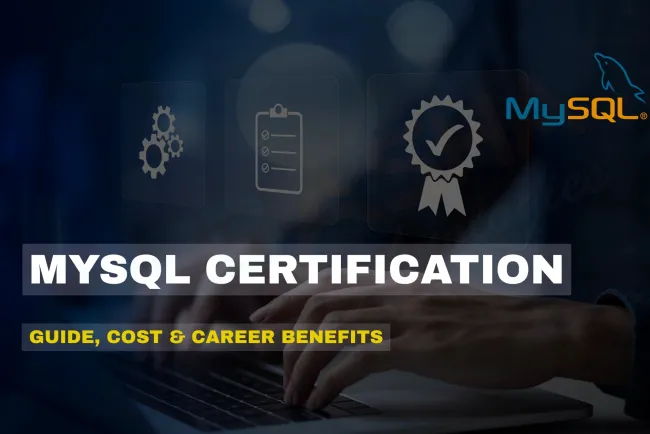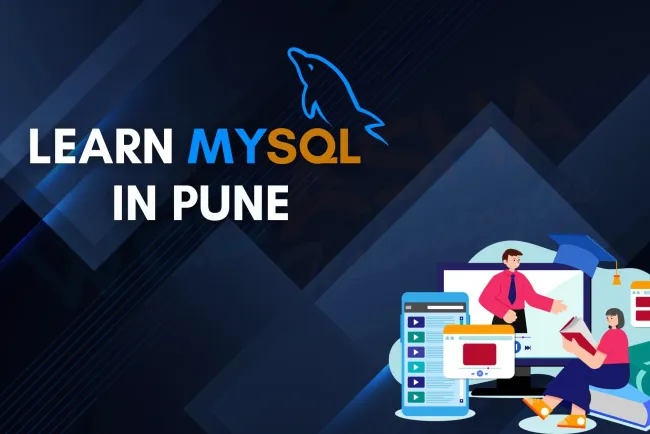Master MySQL with an Online Course | Learn MySQL from Scratch to Expert Level
Embark on a journey to become a MySQL expert with an online course. Learn everything from database design, SQL queries, performance optimization, to securing MySQL databases. This comprehensive MySQL course covers key topics like CRUD operations, advanced queries, stored procedures, and more, helping you build a solid foundation for a career in database management and development.

Table of Contents
- What is MySQL?
- Why Choose an Online MySQL Course?
- Key Topics Covered in MySQL Online Courses
- Benefits of Learning MySQL
- How to Choose the Right MySQL Online Course
- Conclusion
- Frequently Asked Questions (FAQs)
MySQL is one of the most popular open-source relational database management systems (RDBMS) used by companies, developers, and webmasters worldwide. It powers many of the world’s most significant applications, from websites to enterprise systems. If you're looking to gain expertise in MySQL, an online course can provide you with the necessary skills to manage and optimize databases efficiently. Whether you're a beginner or an experienced professional, an online MySQL course can help you develop the expertise required to work with MySQL databases effectively.
In this blog, we will discuss everything you need to know about MySQL online courses, including their benefits, course content, and how they can help you in your career.
What is MySQL?
MySQL is an open-source relational database management system (RDBMS) that uses Structured Query Language (SQL) for managing and querying data. It is highly favored for web applications and online services due to its reliability, speed, and ease of use. MySQL is commonly used with PHP in web development, providing the backend database for a wide range of websites and applications.
Some of the key features of MySQL include:
-
Open Source: Free to use and distribute.
-
Cross-Platform: It works on various operating systems, including Windows, Linux, and macOS.
-
Scalability: Suitable for both small and large-scale applications.
-
Reliability: Known for its stability and robustness in handling complex data management tasks.
-
Security: Offers high levels of data security with advanced features like SSL and encryption.
Why Choose an Online MySQL Course?
Opting for an online MySQL course is an excellent choice for anyone looking to build a career as a database administrator (DBA), backend developer, or data analyst. Here are several reasons why taking an online MySQL course is beneficial:
1. Flexibility and Convenience
With an online MySQL course, you can learn at your own pace from anywhere in the world. Whether you're a student, working professional, or someone looking to switch careers, an online course allows you to study at times that are convenient for you, making it easier to balance learning with your personal and professional commitments.
2. Comprehensive Curriculum
Most MySQL online courses are designed to take you through the concepts in a structured and step-by-step manner. These courses typically start with the basics and gradually introduce more advanced topics, ensuring that you understand each concept before moving on to the next.
3. Affordable
Many online MySQL courses are very affordable compared to traditional classroom-based training. Some platforms even offer free courses, while others offer highly discounted courses with lifetime access to materials.
4. Access to Expert Instructors
Many online courses are taught by industry professionals who have years of experience working with MySQL. This allows you to learn from the best, get hands-on guidance, and ask questions to clear up any confusion.
5. Self-Paced Learning
Online courses offer flexibility in terms of pace. Whether you're a quick learner or need extra time to grasp the concepts, you can move through the material at your own speed. You can revisit topics as needed, ensuring that you truly understand MySQL's inner workings.
Key Topics Covered in MySQL Online Courses
A well-structured MySQL online course typically covers a variety of topics that will equip you with the skills necessary to manage databases efficiently. Here's a breakdown of what you can expect:
1. Introduction to Databases and SQL
Before diving into MySQL, courses often start with an introduction to databases and SQL. You'll learn about the concept of relational databases, tables, and the role of SQL in interacting with databases. Topics include:
-
Database design and architecture
-
Understanding tables, rows, and columns
-
SQL syntax and basic queries
-
Data types and operators in MySQL
2. Database Management and Configuration
Once you have a basic understanding of databases and SQL, MySQL online courses introduce you to setting up and configuring a MySQL database. You will learn how to:
-
Install MySQL on different operating systems (Windows, Linux, macOS)
-
Configure MySQL server settings
-
Secure a MySQL database
-
Backup and restore MySQL databases
3. CRUD Operations
The core of working with any database is performing CRUD (Create, Read, Update, Delete) operations. A MySQL online course will teach you how to:
-
Insert data into tables using INSERT statements
-
Retrieve data with SELECT queries
-
Update existing records using UPDATE
-
Delete records with the DELETE statement
4. Joins and Advanced Queries
One of the most powerful features of SQL is the ability to combine data from multiple tables using JOIN operations. You will learn how to perform different types of joins, such as:
-
INNER JOIN: Retrieves matching rows from both tables.
-
LEFT JOIN: Retrieves all rows from the left table and matching rows from the right table.
-
RIGHT JOIN: Retrieves all rows from the right table and matching rows from the left table.
-
FULL JOIN: Retrieves matching rows from both tables as well as non-matching rows.
5. Indexes and Optimization
Performance optimization is a crucial aspect of database management. MySQL online courses teach you how to create and manage indexes to speed up query execution. You will also learn how to:
-
Analyze slow queries and optimize them
-
Use EXPLAIN to understand query execution plans
-
Improve performance with query optimization techniques
6. Stored Procedures and Triggers
For advanced database management, MySQL courses often cover stored procedures and triggers. You’ll learn how to:
-
Create and manage stored procedures to automate tasks
-
Set up triggers to perform automatic actions when data changes
-
Use views and functions to abstract complex queries
7. Data Security and Access Control
Securing your database is paramount. A MySQL online course will teach you how to:
-
Implement user access control
-
Create, modify, and delete users
-
Set up roles and permissions to limit data access
-
Use SSL encryption for secure data transmission
8. Backup and Recovery
Data loss can be catastrophic. MySQL online courses also emphasize backup and recovery strategies, teaching you how to:
-
Perform full and incremental backups
-
Restore data from backups
-
Use point-in-time recovery to restore databases to a specific state
Benefits of Learning MySQL
Learning MySQL opens the door to many career opportunities, especially in fields like database administration, backend development, and data analysis. Here are some of the key benefits of becoming proficient in MySQL:
1. High Demand for MySQL Professionals
With the increasing reliance on data-driven applications and websites, businesses are always looking for skilled professionals who can design, maintain, and optimize MySQL databases. This makes MySQL expertise highly sought after in the job market.
2. Versatility Across Industries
MySQL is used in various industries, from healthcare to finance and entertainment. Knowing MySQL means you can work in a broad spectrum of sectors, ensuring job security and career growth.
3. Improved Problem-Solving Skills
MySQL courses help you develop critical thinking and problem-solving skills. You will learn how to approach complex data-related challenges and use your knowledge to come up with efficient solutions.
4. Hands-On Experience
Many online MySQL courses provide practical, hands-on assignments where you work on real-world projects. This gives you the opportunity to apply your learning in a practical setting, preparing you for the challenges you'll face in a professional environment.
How to Choose the Right MySQL Online Course
When selecting a MySQL online course, consider the following factors to ensure it’s the right fit for your learning goals:
-
Course Content: Ensure the course covers the topics you're most interested in, whether it’s database design, optimization, or advanced MySQL concepts.
-
Instructor Expertise: Look for courses taught by experienced instructors who have real-world experience with MySQL.
-
Hands-On Projects: Opt for courses that offer practical assignments or projects, so you can gain hands-on experience.
-
Reviews and Ratings: Check student reviews and ratings to gauge the quality of the course and its impact on learners.
Conclusion
Taking an online MySQL course is an excellent way to gain a solid understanding of relational databases and develop the skills necessary to work with MySQL professionally. Whether you're looking to enhance your current skill set or start a career in database administration or web development, a well-structured MySQL course can provide you with the knowledge, tools, and practical experience needed to succeed.
Investing in a quality MySQL online course can open doors to numerous career opportunities in various industries, enabling you to contribute to the growing data-driven world. So, start learning today and enhance your database management skills to stay competitive in the job market.
Frequently Asked Questions (FAQ)
What is MySQL, and why should I learn it?
MySQL is an open-source relational database management system (RDBMS) that uses SQL for database management. Learning MySQL is essential for anyone interested in database administration, web development, and data analysis.
Is MySQL suitable for beginners?
Yes, MySQL is beginner-friendly, and many online courses start with basic concepts such as SQL queries, database design, and data management, making it accessible to newcomers.
What topics are covered in a MySQL online course?
A MySQL course typically covers topics like database installation, CRUD operations, advanced queries, joins, indexes, optimization, stored procedures, triggers, and database security.
How long does it take to complete a MySQL online course?
The duration depends on the course structure, but most MySQL courses can be completed within a few weeks to a couple of months, depending on your learning pace.
Can I learn MySQL online for free?
Yes, there are several free resources and tutorials available online for learning MySQL. However, paid courses may offer more comprehensive lessons, hands-on projects, and certification.
Do I need any prior experience to start a MySQL online course?
No prior experience is necessary, as most courses start with basic database concepts and SQL fundamentals. However, some familiarity with programming languages can be helpful.
What career opportunities can I pursue with MySQL knowledge?
With MySQL knowledge, you can pursue careers in database administration, backend development, web development, data analysis, and business intelligence.
Are MySQL certifications valuable?
Yes, MySQL certifications demonstrate your expertise and can improve your job prospects in roles related to database management, development, and administration.
How can I optimize MySQL queries for better performance?
Optimization techniques such as using indexes, query rewriting, caching, and avoiding subqueries are commonly taught in MySQL courses to help improve query performance.
What are the prerequisites for taking a MySQL online course?
There are no strict prerequisites for learning MySQL, but having a basic understanding of databases and programming concepts can be helpful.
How can I practice MySQL after completing an online course?
You can practice MySQL by working on personal projects, contributing to open-source projects, or using platforms like MySQL Workbench and phpMyAdmin to run queries and manage databases.
Can I take MySQL courses if I already have SQL knowledge?
Yes, if you already know SQL, MySQL courses can help you focus on the specifics of MySQL, including advanced optimization techniques, security, and management.
What is the best way to learn MySQL online?
The best way to learn MySQL online is to choose a well-structured course that offers both theoretical knowledge and practical experience through hands-on projects and exercises.
Are online MySQL courses suitable for professionals?
Yes, many online MySQL courses are designed for professionals who want to enhance their database management skills and pursue certifications.
Is MySQL used in web development?
Yes, MySQL is widely used in web development, especially with PHP, to manage the database for websites and web applications.
Can I install MySQL on any operating system?
Yes, MySQL can be installed on various operating systems, including Windows, Linux, and macOS.
What is the difference between MySQL and other database systems like PostgreSQL?
MySQL is known for its speed and ease of use, while PostgreSQL is often preferred for complex queries and advanced features. Both are excellent database systems but have different strengths.
Is it necessary to learn MySQL if I already know other databases?
If you're familiar with other databases like SQL Server or Oracle, learning MySQL can still be beneficial, especially for working in environments where MySQL is widely used.
Can I use MySQL with cloud platforms?
Yes, MySQL can be integrated with cloud platforms like AWS, Google Cloud, and Azure, making it a flexible option for cloud-based applications.
What is the role of a MySQL database administrator?
A MySQL database administrator is responsible for managing MySQL databases, ensuring their performance, security, backup, and recovery, and troubleshooting any issues that arise.
How do I get certified in MySQL?
You can get certified in MySQL by completing an official MySQL certification exam offered by Oracle or other platforms offering professional certification.
What is the cost of a MySQL online course?
The cost of MySQL online courses varies based on the platform and course content, ranging from free courses to paid options that may cost anywhere from $50 to $500 or more.
What are MySQL joins, and how are they used?
MySQL joins allow you to combine rows from two or more tables based on related columns. They are essential for querying data across multiple tables.
Can MySQL be used for large-scale applications?
Yes, MySQL can handle large-scale applications and databases. It is scalable and used by major companies for mission-critical applications.
Do MySQL online courses include certification?
Many MySQL online courses offer a certificate of completion. However, for official certification, you may need to take an exam provided by Oracle or other certification providers.
How can I secure my MySQL database?
Securing MySQL databases involves tasks like using encryption, setting up access control, creating user accounts with appropriate privileges, and keeping the software up to date.
Is MySQL better for small or large businesses?
MySQL is suitable for both small and large businesses, as it can scale to meet the needs of enterprises while being cost-effective for smaller organizations.
What is the role of indexes in MySQL?
Indexes in MySQL are used to speed up the retrieval of data by allowing the database to quickly locate and access data without scanning the entire table.
What are the best resources to learn MySQL online?
Some of the best platforms to learn MySQL include Udemy, Coursera, edX, and official Oracle documentation.












![Top 10 Ethical Hackers in the World [2025]](https://www.webasha.com/blog/uploads/images/202408/image_100x75_66c2f983c207b.webp)










